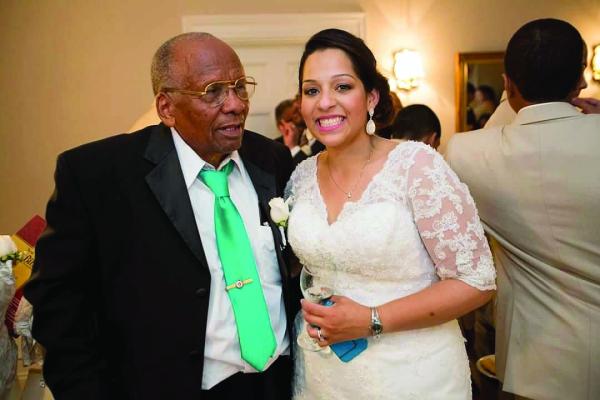May 31, 2023

Brenda Rosa with her late grandfather, Antonio Gomes, who died at age 100.
Photo courtesy Rosa family
As I reflect on my grandfather living to 100, thoughts flood my mind with the recipe for living a long and healthy life. He lived in Boston for more than 50 years after moving to the US from the Cape Verde Islands for work opportunities and better health protection for his wife and children and became a part of the vibrant immigrant community throughout Dorchester.
He passed away in 2022, but I feel good knowing that he lived a long and fulfilling life and enjoyed all his favorite things, including beer, dessert, and television. Nonetheless, is this the secret to living longer and healthier in the city?
The World Health Organization reports that cities are vital in enabling people to live longer and healthier. They focus on eight domains for increasing the health and well-being of aging populations, including housing, transportation, health, outdoor access, social engagement, and employment.
A recent study by the Stanford Center for Longevity projects that many of us – including half of today’s five year olds – will live past 100. We should plan our cities with the expectation that we will live for a long time. Boston’s culture needs a re-direction toward an aging-friendlier framework, from birth to older age, demanding a multigenerational approach.
By 2030, it’s projected that 130,000 people over the age of 60 will reside in Boston. Older adults serve critical societal roles as consumers, workers, caregivers, and volunteers.
The city of Boston recently opened a new senior center in East Boston that is a hub for aging adults and caregivers. This facility features accessibility, an outdoor space, social engagement, and more. By forming social connections, older adults can combat loneliness and social isolation, which have been shown to lead to major declines in physical and cognitive health. Expansions to current community centers throughout the city can provide access for all ages, including aging adults, and lead to richer, healthier lives.
Medical advances and new technologies are driving the trend toward longer lives, but many will face barriers preventing or limiting access. But the beauty of developing aging-friendly cities is that, in the process, we are actually creating cities for all ages and abilities. Curb cuts are helpful for wheelchair and cane users, but also for strollers and children learning to ride bikes. Multigenerational community programming engages people of all ages while increasing generational cohesion. Revitalizing parks and green spaces promote positive connections to nature for all ages.
Boston’s Age Strong Commission is already leading the Age-Friendly Boston initiative, which focuses on everything from food access to housing to transportation. Yet more can be done in partnership with, and separate from, the commission, including right here in Dorchester.
My grandfather was not alone in living to 100. The United Nations projects 3.7 million centenarians will be alive by 2050. So, let’s create a Boston, and a Dorchester, where we want to raise our children in and grow old in. A place that facilitates social and economic engagement throughout the lifespan, with good health care and entertainment.
Brenda Rosa, MSW, is a Dorchester resident, a graduate of the Boston College School of Social Work (this month), and a career civil servant.


